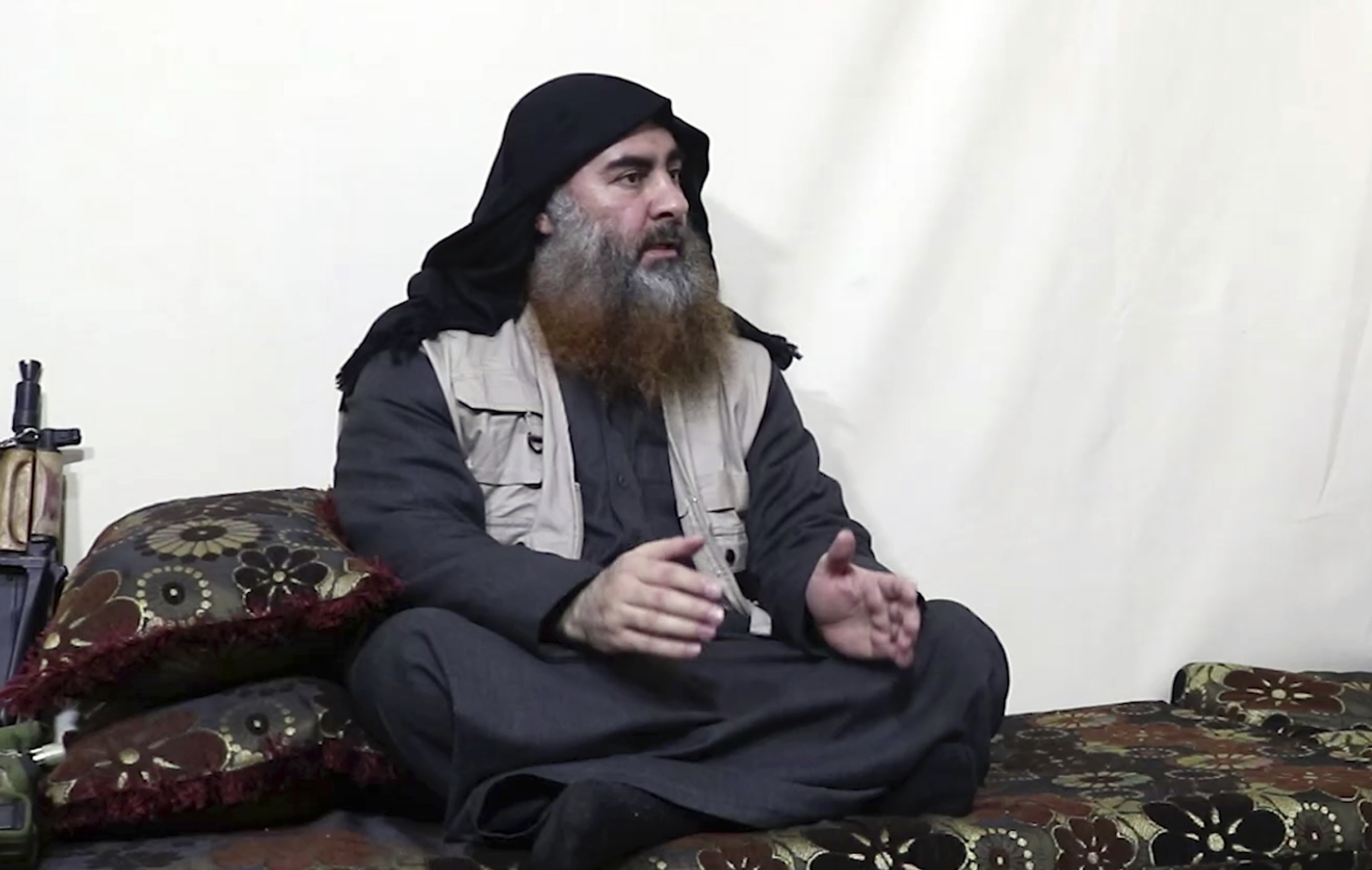ISIS leader Abu Bakr al-Baghdadi appeared to be featured in a rare new video released Monday
The 18-minute video featuring both audio and visuals.
Islamic State leader Abu Bakr al-Baghdadi appeared to be featured in a rare new video released Monday -- only his second ever -- to show he is alive by speaking about the recent fall of his group's stronghold in Baghouz, Syria, as well as praising the pre-Easter Sri Lanka terrorist bombings.
In an 18-minute video featuring both audio and video of Baghdadi seated on a floor with masked ISIS lieutenants, he said the April 21 Sri Lanka attacks on several churches, which killed at least 253 people, were revenge for the siege and fall of their last redoubt in Baghouz, according to a translation by the SITE Intelligence Group, which monitors jihadi propaganda.
"As for your brothers in Sri Lanka, they have put joy in the hearts of the monotheists with their immersing operations that struck the homes of the Crusaders in their Easter, in vengeance for their brothers in Baghouz," Baghdadi said, chuckling over the high number of casualties.

"This is part of the vengeance that awaits the Crusaders and their henchmen, Allah permitting. Praise be to Allah, among the dead were Americans and Europeans," he said.
The statement about Sri Lanka appeared in an audio portion of the video that did not show Baghdadi, which may have been tacked on after he was filmed following the fall of Baghouz, according to SITE's director Rita Katz.
Baghdadi appeared healthy in a black headscarf, khaki fishing vest and with a bushy grey beard, dyed with red henna in a Ramadan tradition many trace to the Prophet Mohammed, whom Baghdadi claims a direct family lineage to. By his side was a Russian AK-74U assault rifle.
The elusive leader -- who declared himself "Caliph," or leader of all Muslims, in his only other video in July 2014 in a Mosul, Iraq, mosque -- carries a $25 million U.S. bounty on his head.
U.S. special operations forces have concentrated the hunt for him in western Iraq in recent months, a counterterrorism official said, and Iraqi military aircraft recently dropped leaflets over the Sunni-dominated town of Ramadi reminding Iraqis of the large reward for his capture or confirmed killing.
"It's not a huge shock to see him. Everything we've heard has indicated he was still alive. And if he wasn't, we would expect ISIS to make a big production out of it," J.M. Berger, author of "ISIS: The State of Terror," told ABC News.
"It's impressive, given the amount of pressure he is under geographically, and also pretty interesting that his security apparatus can turn a video around so quickly without exposing him to airstrikes," Berger added.
Just last month, Ambassador Jim Jeffrey, the special envoy to the Global Coalition to Defeat ISIS, said the U.S. did not have information about Baghdadi's whereabouts.
"We don't know where he is, and finding the top leadership of ISIS or other terrorist groups is always a priority," Jeffrey said.
Baghdadi may have felt there was no more important time to prove his group's resilience and lethality, since President Donald Trump has boasted this month of obliterating the ISIS caliphate "100-percent" from its once enormous territory stretching over vast portions of northern Syria and Western Iraq.
ISIS had recently also for the first time claimed responsibility for the October 2017 attack on an American special forces team in Niger that killed four U.S. soldiers and four Nigerien troops, and, in the video, Baghdadi praised the leader of ISIS in Mali.
The eight coordinated suicide bombings in Sri Lanka this month were the deadliest ISIS attack ever.
ISIS became infamous in 2014 for producing horrifying videos of its fighters executing prisoners -- including the beheading of several Western hostages, Americans among them. Around then the group also held an American female hostage, Kayla Mueller of Arizona, whom al-Baghdadi sexually abused, according to counterterrorism officials and her fellow hostages. Mueller was killed in February 2015 under unknown circumstances.
Al-Baghdadi was rumored to have been wounded or killed many times since 2014, often in unproven claims by the Iraqi military, which al-Baghdadi himself occasionally debunked with timely audio recordings.
U.S. special operations forces thought they had killed al-Baghdadi south of Raqqa in a compound obliterated by heavy bombardment in August 2017, but his death was never confirmed by DNA or other intelligence collection, an intelligence official told ABC News at the time. He then released an audio speech that September.
"The truth is that the war of Islam and its people with the people of the cross is a long war, and the war of Baghouz is over and manifested in it is the wildness and the savagery of the people of the cross towards the people of Islam and at the same time. And it demonstrates and manifested in it, is the courage and resilience and persistence of the people of Islam," Baghdadi said in the new video.
Former CIA analyst Nada Bakos, whose focus was al-Qaeda in Iraq before it became ISIS, said Baghdadi is becoming "a covert leader of an umbrella organization."
"He is being opportunistic, probably because he has limited ability to move and communicate, coordinate and direct operations," she said.




